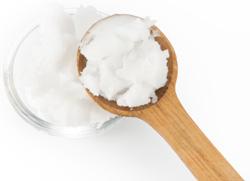 As fans of both oil pulling and coconut oil – and especially the both together! – we were pleased to see yet more research supporting their oral health benefits.
As fans of both oil pulling and coconut oil – and especially the both together! – we were pleased to see yet more research supporting their oral health benefits.
The pilot study, recently published in the Nigerian Medical Journal, focused on a single question: How does pulling with coconut oil affect gingivitis (early stage gum disease) caused by the accumulation of plaque? To find out, the researchers gathered 60 young adults with the condition and had them add coconut oil pulling to their regular hygiene for 30 days. Plaque levels and perio status were measured on the first, seventh, fifteenth and thirtieth days.
Within a week, the researchers observed statistically significant improvement. That improvement continued to the end of the study.
So again, we see that coconut oil pulling works. But why? What’s so special about coconut oil?
As we noted before, coconut oil turns out to have real antimicrobial qualities, especially when it comes to oral pathogens. Not only has it been shown to control S. mutans – a key player in dental caries (tooth decay) – but also Candida albicans, a yeast that teams up with S. mutans to form tougher, more persistent biofilms (plaque).
And these are far from the only microbes coconut oil may keep in check. As a 2014 research review describes it,
Recently, results from many studies revealed that the monolaurin, the monoglycerides of lauric acid from coconut oil had antimicrobial activity against various Gram-positive and Gram-negative organisms, including Escherichia vulneris, Enterobcater spp., Helicobacter pylori, Staphylococcus aureus, Candida spp., including Candida albicans, Candida glabrata, Candida tropicali, Candida parapsilosis, Candida stellatoidea and Candida krusei, as well as enveloped viruses. Though the exact antibacterial mechanism of the action of coconut oil is still unclear, it was hypothesized that monolaurin and other medium chain monoglycerides had the capacity to alter bacterial cell walls, penetrate and disrupt cell membranes, inhibit enzymes involved in energy production and nutrient transfer, leading to the death of the bacteria.
Yet other research has documented coconut oil’s anti-inflammatory – as well as pain-relieving and fever-reducing – properties, and the authors of the current study point to yet another possibility. They suggest that the lauric acid in the coconut oil may react with sodium hydroxide in saliva, making the oil clean in a soap-like way.
Presuming all of these findings continue to be confirmed, it’s not hard to understand why coconut oil has such a powerful impact on oral health.
Yet it’s not the only option there is when it comes to oil pulling. In fact, the traditional oils are sunflower and sesame, and numerous studies show them to be effective, too. Are they better or worse than coconut oil? The current study can’t say. The researchers didn’t compare oils, so they couldn’t say that coconut is better than any other.
We mention this as not everyone likes coconut oil. Since it’s solid at room temperature, you have to let it melt in your mouth, which some people find unpleasant. Others just aren’t fond of the taste. If that’s the case for you, there’s certainly nothing wrong with using one of the traditional oils. After all, the point is to pull regularly, and if you dislike the taste or experience, that’s just not going to happen.
Whichever oil you choose, be sure to opt for a good quality, organic and minimally processed oil. Trader Joe’s is one good source for them at reasonable prices.
Indeed, the minimal cost of oil pulling is one of several benefits noted in a brief commentary in the Indian Journal of Dental Research a few years back. The others? It doesn’t stain the teeth like some mouthwashes can, there’s no aftertaste, and it’s readily available.
And, we’d add, there really appears to be no downside. Not many things you can say that about these days.